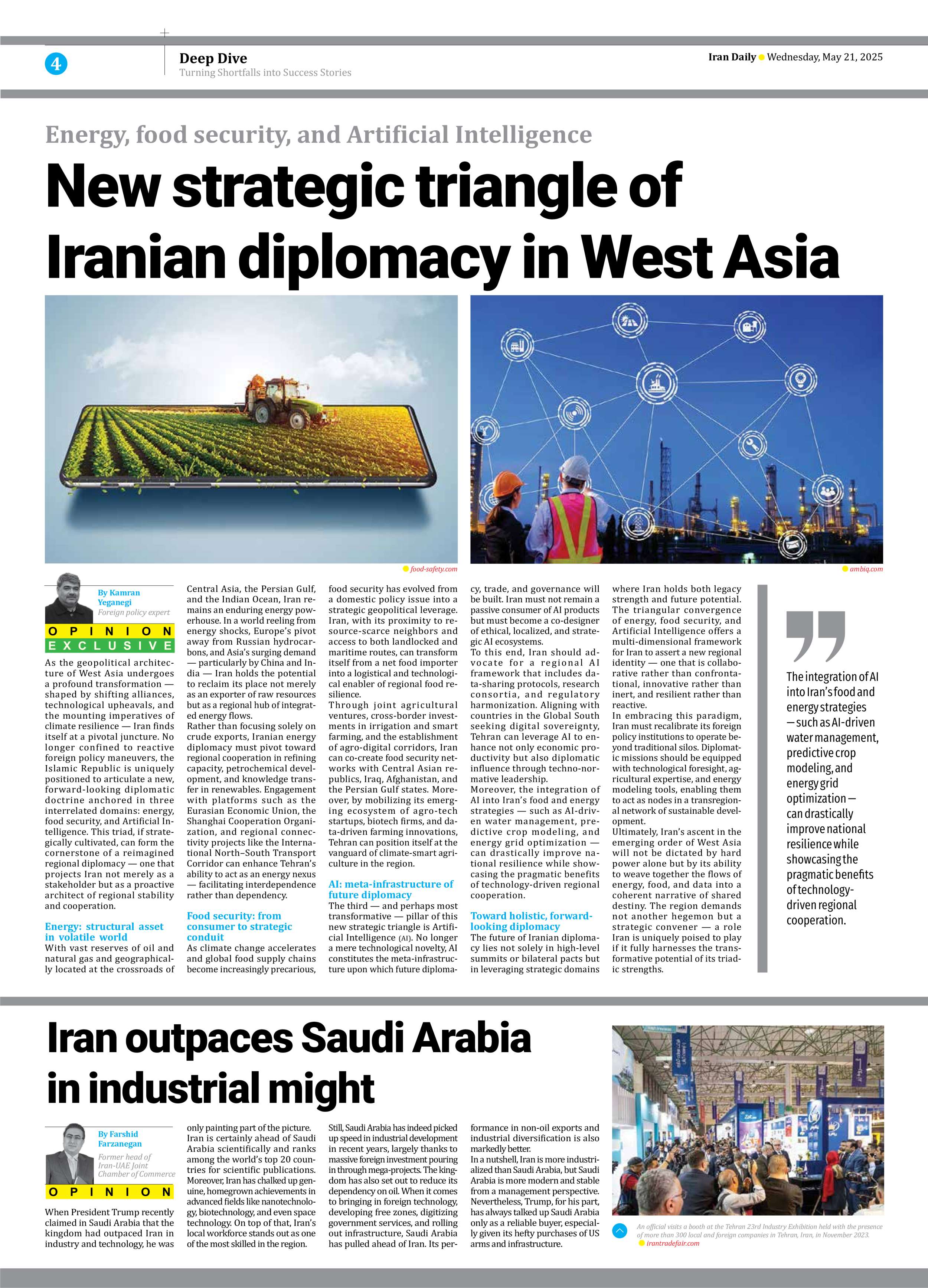
Energy, food security, and Artificial Intelligence
New strategic triangle of Iranian diplomacy in West Asia
By Kamran
Yeganegi
Foreign policy expert
As the geopolitical architecture of West Asia undergoes a profound transformation — shaped by shifting alliances, technological upheavals, and the mounting imperatives of climate resilience — Iran finds itself at a pivotal juncture. No longer confined to reactive foreign policy maneuvers, the Islamic Republic is uniquely positioned to articulate a new, forward-looking diplomatic doctrine anchored in three interrelated domains: energy, food security, and Artificial Intelligence. This triad, if strategically cultivated, can form the cornerstone of a reimagined regional diplomacy — one that projects Iran not merely as a stakeholder but as a proactive architect of regional stability and cooperation.
Energy: structural asset in volatile world
With vast reserves of oil and natural gas and geographically located at the crossroads of Central Asia, the Persian Gulf, and the Indian Ocean, Iran remains an enduring energy powerhouse. In a world reeling from energy shocks, Europe’s pivot away from Russian hydrocarbons, and Asia’s surging demand — particularly by China and India — Iran holds the potential to reclaim its place not merely as an exporter of raw resources but as a regional hub of integrated energy flows.
Rather than focusing solely on crude exports, Iranian energy diplomacy must pivot toward regional cooperation in refining capacity, petrochemical development, and knowledge transfer in renewables. Engagement with platforms such as the Eurasian Economic Union, the Shanghai Cooperation Organization, and regional connectivity projects like the International North–South Transport Corridor can enhance Tehran’s ability to act as an energy nexus — facilitating interdependence rather than dependency.
Food security: from consumer to strategic conduit
As climate change accelerates and global food supply chains become increasingly precarious, food security has evolved from a domestic policy issue into a strategic geopolitical leverage. Iran, with its proximity to resource-scarce neighbors and access to both landlocked and maritime routes, can transform itself from a net food importer into a logistical and technological enabler of regional food resilience.
Through joint agricultural ventures, cross-border investments in irrigation and smart farming, and the establishment of agro-digital corridors, Iran can co-create food security networks with Central Asian republics, Iraq, Afghanistan, and the Persian Gulf states. Moreover, by mobilizing its emerging ecosystem of agro-tech startups, biotech firms, and data-driven farming innovations, Tehran can position itself at the vanguard of climate-smart agriculture in the region.
AI: meta-infrastructure of future diplomacy
The third — and perhaps most transformative — pillar of this new strategic triangle is Artificial Intelligence (AI). No longer a mere technological novelty, AI constitutes the meta-infrastructure upon which future diplomacy, trade, and governance will be built. Iran must not remain a passive consumer of AI products but must become a co-designer of ethical, localized, and strategic AI ecosystems.
To this end, Iran should advocate for a regional AI framework that includes data-sharing protocols, research consortia, and regulatory harmonization. Aligning with countries in the Global South seeking digital sovereignty, Tehran can leverage AI to enhance not only economic productivity but also diplomatic influence through techno-normative leadership.
Moreover, the integration of AI into Iran’s food and energy strategies — such as AI-driven water management, predictive crop modeling, and energy grid optimization — can drastically improve national resilience while showcasing the pragmatic benefits of technology-driven regional cooperation.
Toward holistic, forward-looking diplomacy
The future of Iranian diplomacy lies not solely in high-level summits or bilateral pacts but in leveraging strategic domains where Iran holds both legacy strength and future potential. The triangular convergence of energy, food security, and Artificial Intelligence offers a multi-dimensional framework for Iran to assert a new regional identity — one that is collaborative rather than confrontational, innovative rather than inert, and resilient rather than reactive.
In embracing this paradigm, Iran must recalibrate its foreign policy institutions to operate beyond traditional silos. Diplomatic missions should be equipped with technological foresight, agricultural expertise, and energy modeling tools, enabling them to act as nodes in a transregional network of sustainable development.
Ultimately, Iran’s ascent in the emerging order of West Asia will not be dictated by hard power alone but by its ability to weave together the flows of energy, food, and data into a coherent narrative of shared destiny. The region demands not another hegemon but a strategic convener — a role Iran is uniquely poised to play if it fully harnesses the transformative potential of its triadic strengths.







